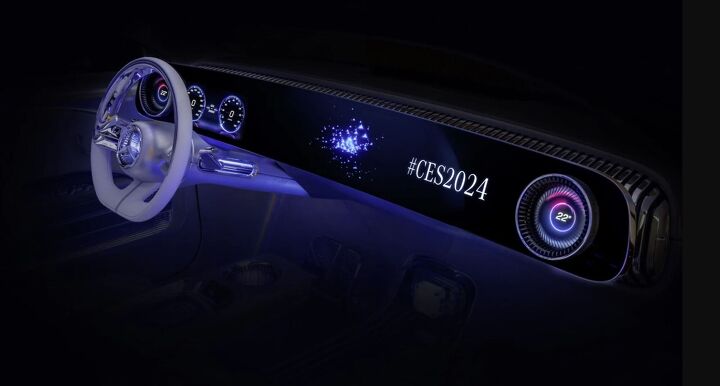Has Mercedes-Benz Forgotten What Constitutes Luxury?

Mercedes-Benz is teasing the next generation of its user experience ahead of the official reveal it has scheduled for CES 2024. The proprietary Mercedes-Benz User Experience (MBUX) is said to boast a voice assistant that uses artificial intelligence and more space for screens than ever before.
Details are limited before the official premiere. But the company has promised a new visual interface, developed with game-engine graphics from Unity, that is supposed to help drivers communicate with the new voice assistant. It’s also going to feature a “selfie camera” installed in the cabin.
Framed as a way to take candid pictures of vehicle occupants by the manufacturer, the device has actually been mandated by the European Commission for all new vehicles by 2026 as a way to “combat distracted driving.” The United States has a similar program under the so-called Bipartisan Infrastructure Law running on an identical timeline. Though it’s operating under the auspices of combating drunk driving and doesn’t have a firm regulatory framework in place.
While in-cabin cameras have started to appear on vehicles featuring "hands-free" driving aids to allegedly guarantee operator attentiveness, Mercedes seems to be the first automaker planning to put them into an entire vehicle lineup. Future implementation may hinge on how these camera systems are received by the public. Some drivers seem fine with having cameras, controlled by a multinational corporation, installed into the dashboard. But others, myself included, are ready to go to war over automotive privacy and what constitutes true vehicle ownership — as none of this seems emblematic of a healthy society.
The entire, button-free design being previewed runs the risk of not resonating with Western audiences, frankly. Driver satisfaction surveys from the U.S. have certainly been trending down in recent years. While some of that pertains to lapses in overall reliability occurring in recent years, changing infotainment systems look to be the largest contributing factor. People are finding the technologies equipped to modern cars more invasive and difficult to use than hoped.
While touchscreens do create new ways of interfacing with the vehicle and allot for additional user customization, they have also encouraged brands to swiftly move away from traditional vehicle controls. This is despite overwhelming evidence that buttons and knobs are easier to use, safer to operate while a vehicle is in motion, and often end up being preferred by drivers.
Though it could be argued that the biggest issue could be how quickly the new interface will make Mercedes’ future products look dated. One of the reasons people appreciate German brands is due to the fact that their vehicles tend to age with some amount of grace. For decades, companies like Mercedes-Benz and BMW were stressing the fundamentals while deftly implementing the latest technologies.
By contrast, the Mercedes-Benz of today seems to believe that technology and luxury are wholly synonymous. An automobile cannot be considered truly luxurious or premium by the brand if it's not beating you over the head with the latest infotainment gimmicks.
"Mercedes-Benz is reinventing the digital passenger experience by leveraging AI to offer human-like interaction with the intelligent MBUX Virtual Assistant," stated Ola Kallenius, CEO of Mercedes-Benz. "It includes empathetic characteristics that sync with your driving style and mood. Paired with our in-house MB.OS architecture, this approach will define the future of digital luxury."
Considering that the brand’s average customer in America is roughly 55 and likely to be growing tired of having to manage their vehicle through another phone app, it seems like Mercedes is shooting itself in the foot here. But then we would be forgetting the importance of China.
All of the above is emblematic of what the Chinese market considered luxury. The region gravitates toward spacious cabins boasting high levels of visual opulence and doesn't seem to care one whit about performance. They want plush upholstery with ornate stitching, chrome accenting, widespread automation, and the promise of something being high tech.
A lot of the automotive trends Chinese luxury brands are running with today were copied from high-end German products of the past. But one item that seems to have come full circle is massive screens that encompass the entire dashboard. You can hardly find a high-end Chinese automobile produced today without them. This is important because China has become Mercedes’ largest market by a wide margin. European volumes likewise dwarf North American sales, further encouraging the brand to make decisions that might not be as popular here.
Embedding vehicle controls through touch screens is also often cheaper than having to source and install a series of physical controls stemming from numerous suppliers. But this likely wasn’t the case for the updated MBUX system. While it will undoubtedly create new revenue opportunities for the brand via connected services and subscription fees, the development costs to produce the updated version of Mercedes visual interface still had to be significant.
Credit should be given where credit is due. It is not as if the company simply threw in a 12-inch screen, added a silver bezel, and called it a day. The display takes up the entire width of the vehicle and comes with graphics that are supposed to adapt to your mood based on how the car perceives your present emotional state. Benz has everything riding on the new MBUX system being a winner and wants it to dazzle people so they don't question some of its more insidious aspects or why it the company keeps downsizing engines.
We’ll gain a better understanding of the interface when CES (formerly the Consumer Electronics Show) kicks off in Las Vegas next month. But it looks like Mercedes continues betting big on connectivity technologies and bold cabin designs it believes won’t alienate drivers or make the interior look horribly dated in a few years.
[Images: Mercedes-Benz]
Become a TTAC insider. Get the latest news, features, TTAC takes, and everything else that gets to the truth about cars first by subscribing to our newsletter.

A staunch consumer advocate tracking industry trends and regulation. Before joining TTAC, Matt spent a decade working for marketing and research firms based in NYC. Clients included several of the world’s largest automakers, global tire brands, and aftermarket part suppliers. Dissatisfied with the corporate world and resentful of having to wear suits everyday, he pivoted to writing about cars. Since then, that man has become an ardent supporter of the right-to-repair movement, been interviewed on the auto industry by national radio broadcasts, driven more rental cars than anyone ever should, participated in amateur rallying events, and received the requisite minimum training as sanctioned by the SCCA. Handy with a wrench, Matt grew up surrounded by Detroit auto workers and managed to get a pizza delivery job before he was legally eligible. He later found himself driving box trucks through Manhattan, guaranteeing future sympathy for actual truckers. He continues to conduct research pertaining to the automotive sector as an independent contractor and has since moved back to his native Michigan, closer to where the cars are born. A contrarian, Matt claims to prefer understeer — stating that front and all-wheel drive vehicles cater best to his driving style.
More by Matt Posky
Latest Car Reviews
Read moreLatest Product Reviews
Read moreRecent Comments
- AZFelix With both fuel lines and battery packs, Lamborghini owners can soon wager on which part of the engine will instigate the self immolation of their super cars.
- Namesakeone The realities of the market have spoken: with a little help of a lingering recession (in that most families need a car for every purpose, rather than affording multiple cars as once was true), and with a little advertising-prodding from the manufacturers, the SUV and crossover have, in turn, replaced the station wagon, the minivan, and now the sedan. (Or maybe the minivan replaced the station wagon. Whatever.) I still like cars, but the only votes are the ones that a.) come to new-car dealerships, and b.) come with money attached. Period.
- MaintenanceCosts "But your author does wonder what the maintenance routine is going to be like on an Italian-German supercar that plays host to a high-revving engine, battery pack, and several electric motors."Probably not much different from the maintenance routine of any other Italian-German supercar with a high-revving engine.
- 28-Cars-Later "The unions" need to not be the UAW and maybe there's a shot. Maybe.
- 2manyvettes I had a Cougar of similar vintage that I bought from my late mother in law. It did not suffer the issues mentioned in this article, but being a Minnesota car it did have some weird issues, like a rusted brake line.(!) I do not remember the mileage of the vehicle, but it left my driveway when the transmission started making unwelcome noises. I traded it for a much newer Ford Fusion that served my daughter well until she finished college.


































Comments
Join the conversation
Going in the opposite direction could open a niche that keeps Cadillac and Lincoln alive. Oh wait, they care more about the Chinese market as well.
I would say, "No, but maybe Mercedes wants *you* to forget what constitutes luxury."